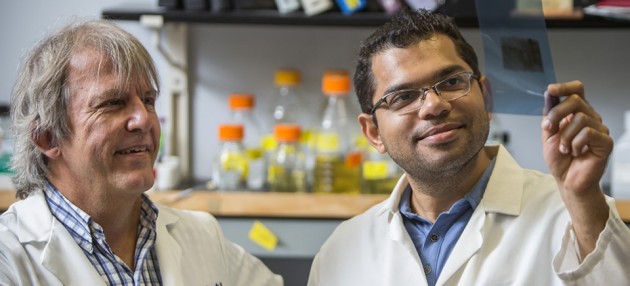Publisher's note: The author of this post, Amy Adams Ellis, is a contributor to ECU News Services.
ECU researcher snags funding to keep studying biological warfare agent
Twenty-seven years of studying the bacterium Brucella have only served to increase Dr. Marty Roop's fascination with it. That's a good thing, because Roop, professor in the Brody School of Medicine's Department of Microbiology and Immunology, recently landed a grant from the National Institutes of Health to continue studying this organism that can knock grown men to their knees and keep them there for weeks.
The new two-year, $364,000 grant will help Roop's team continue laying groundwork for a vaccine to prevent Brucella's crippling effects in humans. More specifically, they're trying to determine exactly how the organism produces disease in the host.
Brucellosis – the disease caused by Brucella – is the world's leading zoonosis, or infection that occurs naturally in animals. Humans become accidental hosts through contact with animals like cattle, sheep, goats and swine, as well as animal products. The resulting flu-like symptoms are both debilitating and long-lived – but seldom fatal – making Brucella an ideal biological warfare agent.
Research associate Josh Pitzer assists in the Brucella research under way at the Brody School of Medicine. (Photos by Cliff Hollis)
"Having to care for thousands of sick people can wreak more havoc than dealing with as many deaths," said Roop, who conducted years of research on Brucella at Louisiana State University Medical Center-Shreveport before joining Brody in 2001.
Roop said there are animal vaccines for the bacterium, but no vaccine that works in humans. "The current vaccines make us sick," Roop said. "But if we can learn how Brucella produces disease, we can use genetic engineering to create strains without the ability to produce disease. Those strains could then be used in a human vaccine."
Brucellosis is highly infectious, Roop said. Treatment requires six to eight weeks of two different antibiotics, which often produce undesirable side effects of their own. Patients are typically bedridden for the duration of the disease.
Brucella is rare in the United States but common worldwide, according to Roop. "A vaccine could greatly benefit our military troops who might consume dairy products in countries where agricultural agencies don't control the disease in animals and where milk from these animals isn't routinely pasteurized," he said.
The particular type of grant Roop was awarded encourages researchers to venture out slightly from their former areas of focus. In this case, Roop and his fellow researchers will transition from exploring Brucella's dependence on iron for survival to exploring its need for a different metal: manganese.
That's enough to keep Roop fascinated for quite a while, he said.
"Brucella's natural ecological niche is a microphage, the white blood cell that's part of our innate immunity system – the cell that normally kills invading pathogens," he said. "I just can't get over the fact that 'our bug' has evolved to be able to avoid our natural defenses and make a nice little happy home for itself right inside this particular cell," he said, laughing.
Roop's lab is the only one in North Carolina researching Brucella, but there are between 10 and 15 labs working on it nationally, he said. "It's a small community, and we openly share data with each other," he added.
Roop's team includes graduate students Ahmed Elhassanny and David Martinson, research associate Josh Pitzer, research technician John Baumgartner and Dr. Daniel Martin, research associate professor in microbiology and immunology.

ECU professor Dr. Marty Roop, left, and graduate student Ahmed Elhassanny are studying the Brucella bacterium at the Brody School of Medicine. A recent grant from the National Institutes of Health will support the ongoing research.

























